It’s fair to say that things haven’t been so great in Somalia these last two decades. The breakdown of what was a not particularly pleasant military government in 1991 led to 21 years of on-off (mainly on) civil war and regional conflict. Outside governments have meddled (both diplomatically and with their various militaries), clans have fought and militarised Islamist groups – most notably Harakat al-Shabaab al-Mujahideen – have controlled large swathes of territory and terrorised the Somali nation.
Things are changing, though. Al Shabaab is on the run, pushed back by African Union troops working alongside Ethiopians and Americans. A new parliament has been sworn in and will elect a president, a speaker and a prime minister next month. American drone strikes are common and have killed civilians as well as key Shabaab leaders. At the moment, though, they are tolerated.
Somalia is in its happy place right now, the optimism rushing through the nation encapsulated in the current hit song, “Yaan La Dooran, Ya La Doortaa”, which, loosely translated, means “Let’s elect… let’s not elect.” The song is by four famous Somali singers named Mohamed Ahmed Qomal, Hussien Shire, Abdulkadir AJ and Nuur Jama Aden, is being played everywhere and tells people to think about what kind of leader would be good for Somalia. I caught up with my friend Abdurrahman Warsameh, who is a Somali journalist living in Mogadishu, to find out about the song.
Abdurrahman doing his thing
http://www.vice.com/en_uk/read/somali-election-song
JWN: Hi Abdurrahman, when do you think there might be elections?
It’s impossible to say. Organised elections cannot be held right now due to security because, as you know, the government does not control all of the country. The plan is that a permanent Somali government will work to ensure that, next time, the people will be able to vote and that there will be a referendum on the current constitution. Hopefully there can be elections in the next four years.
Can you tell me about this song? When did it start getting played a lot?
It was written at the end of 2008, around the time of a big conference on Somalia held in Djibouti. Elections for the next president were being talked about at the time. The songwriter thought it was the right moment for the people to be aware of the competition that was going on, although the general public wouldn’t have a chance to vote. Right now, the song is setting the election mood in the city and it’s getting played on all the radio stations. The song doesn’t endorse any particular candidate, it just mentions what kind of person would be a good leader and what kind of person would be a bad leader.
What does the song say are the good and bad qualities?
Basically, the song appeared at a time when people had big hopes that the fighting would end in Somalia, because the government and the opposition looked like they would stop fighting. The song says that a good leader should be honest, democratic, not corrupt, respect human rights, as well as the rights of children, women and all humanity. On the other hand, a bad leader would be someone who had made war in the country, bloodied their hands, divided people along clan lines and was unpatriotic. It also talks about radical clerics and Islamists who create problems in the country.
Is the song getting played in the street and in other public places, as well as on the radio?
Very much so, yes. It’s being played everywhere. Usually, Somali songs are about love and emotional things like that, particularly in Mogadishu. Now, this political song has captured people’s imaginations. Ever since 2009, people have been listening to it and now, because it is election time, it’s more popular than ever. Each and every candidate wants to be the person the song talks about.
Is this one of the first Somali songs to be about politics?
Exactly, exactly. We don’t have free and fair elections but, in the last ten years, we’ve had a kind of Somali style democracy, whereby each clan has elected people to represent them in parliament. In a sense, this is the first kind of song that talks about elections. It’s opened a new door of political songs. There have been some copycat songs, but this is the one that has been constantly played. You could say that it is the first political Somali song.
Is there any nightlife in Mogadishu at the moment?
Somalia and Mogadishu have been changing in the last year. In previous years, the only things occupying people’s minds were the gun fighting, famine and bloodshed. Since the withdrawal of Al Shabaab from Mogadishu, people have come back to their homes, and there have been signs of nightlife returning to the city. Businesses can now stay open until the middle of the night, whereas before, they were closing at 5PM. In fact, everything would stop at that time and people just had to stay indoors. When the daily artillery shower began, I had to put my family in different rooms because, if one room were hit, then only one member of the family would die. But Al Shabaab has withdrawn, things are changing and people are listening to this song in the street and at local shops. It’s being played on every street, and every street is a building site – things are being built again.
Do people go out dancing in Mogadishu? And is there any live music?
Usually people are very conservative here, but there are people in hotels and other places who like to dance. It definitely happens, but it is quite secretive. Live music definitely happens as well. When Al Shabaab was a force in the country and was controlling most of Mogadishu, no one could play live music, but now they’ve been pushed out to the hinterlands, live music is being played again. Local bands are performing, mainly in houses and hotels. It is normally private.
The song definitely has Western pop influences but there’s something else going on. Are there other groups playing this kind of music? And how much of a traditional Somali influence is there?
The artists making this music are from the Somali diaspora, expatriate Somalis living in Europe, so they’re very influenced by Western pop music. There are a lot of people into local music and it is an influence, but most songs made in the last 25 years, a time in which many Somalis have moved abroad because of the insecurity here, have been influenced by music from the rest of the world. Most Somali songs are made outside of the country and are written and performed by musicians living in the West. Now people are starting to come back to Somalia.
That’s great news. Thanks very much Abdurrahman.
Thank you!


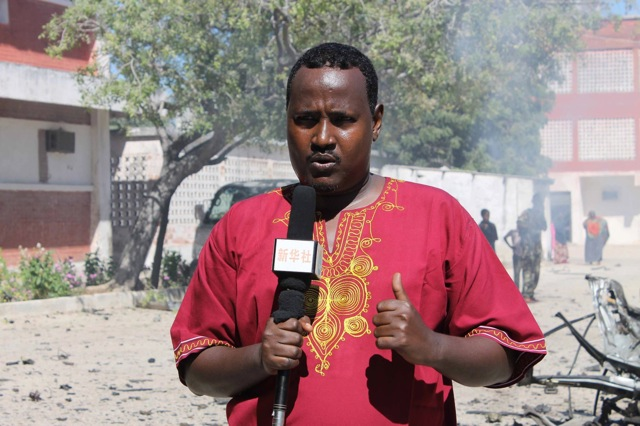




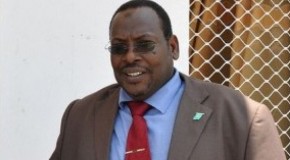



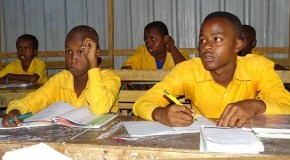
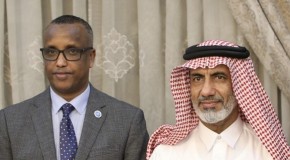




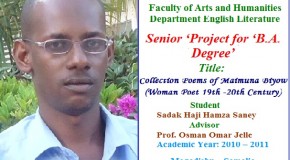


Comments are closed.